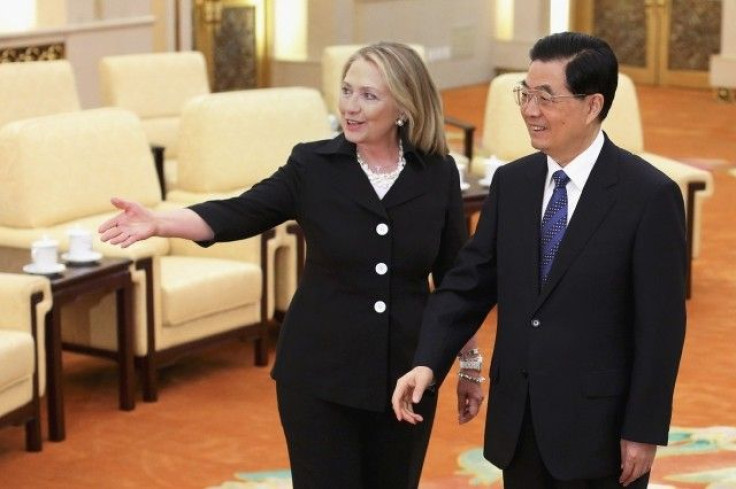Chinese President's Likely Successor Cancels Meeting With Clinton; Visit Fails To Bridge Divide

Chinese President Hu Jintao's touted successor Xi Jinping canceled his meeting with visiting U.S. Secretary of State Hillary Clinton on a short notice, a State Department official said Wednesday.
The meeting was canceled due to "unexpected scheduling reasons," the official who wished to remain anonymous was quoted as saying by the AFP.
"We understand from the Chinese side that Vice President Xi's meetings with the prime minister of Singapore and a Russian official have also been cancelled today," the official said.
The Wall Street Journal reported, citing a U.S. official, that Xi, who is 59 years old, cancelled the meeting because of a back injury. The cause and the severity of the injury weren't clear, the report said.
Chinese Foreign Minister Yang Jiechi said there should not be "unnecessary speculation."
However, Clinton's meeting with Hu and Yang failed to address growing friction between the nations despite both parties pledging cooperation.
Clinton said the current disagreements did not have to strain Washington's relations with Beijing.
"I am very proud of the strength and resilience that we have built into our relationship," Clinton was quoted as saying by Reuters after talks with Yang.
"It makes it possible for us to talk about anything, and to find ways to tackle issues frankly and forthrightly," Clinton said, adding that the two sides would not agree on all the issues that are part of their relationship.
Yang echoed Clinton's statement saying, "We hope that China and the United States will work together to develop a positive and pragmatic relationship."
Notwithstanding their upbeat tone, both leaders failed to reach a common ground on grueling issues including China's support to Syrian President Bashar al-Assad and territorial disputes in South China Sea.
"It is no secret that we have been disappointed by Russia and China's actions blocking tougher U.N. Security Council resolutions and we hope to continue to unite behind a real path forward to end the violence in Syria," Clinton said at a joint press conference with Yang, according to the Associated Press.
Yang defended Chinese stance on Syrian crisis saying the uprising should resolve itself without any external intervention.
"I think history will judge that China's position on the Syria question is a promotion of the appropriate handling of the situation, for what we have in mind is the interests of the people of Syria and the region," Yang said.
Chinese media extended a less than warm welcome to Clinton, with official Xinhua news agency slamming the U.S. for showing "little respect for China's sovereign rights" in the Asia-Pacific and for working with ASEAN "despite China's strong and perennial opposition."
"Though U.S. Secretary of State Hillary Clinton has said the Asia-Pacific is big enough to hold both China and the United States, Washington still need to take concrete actions to improve its ties with China," Xinhua said, adding that the U.S. "fears that a rising China might ultimately challenge its leadership in the Asia-Pacific region and across the world."
"The United States has promised a 'neutral' stand in the disputes between Beijing and Tokyo over China's Diaoyu Islands, yet it constantly proclaims that the isles are covered by a security treaty Washington signed with Tokyo in 1951. Moreover, Washington has been trying to work with a number of Southeast Asian nations to force China into a multinational solution to territorial rows in the South China Sea, despite China's strong and perennial opposition," the commentary said in the wake of China's territorial disputes with Japan over an archipelago in East China Sea, and with Southeast Asian nations over the resource-rich South China Sea.
Chinese newspaper Global Times, a publication with a nationalistic bent, said Tuesday that Clinton's "pivot" to Asia diplomacy policy could only raise "the mutual mistrust" between U.S. and China while failing to bring "pragmatic benefits to the U.S."
Chinese Communist Party's People's Daily criticized Washington for trying to gain leverage from Asia's regional tensions involving China.
"The United States' recent conduct concerning the Diaoyu islands and South China Sea issues cannot but create the suspicion that it is attempting to sow discord in order to fish for advantage," the commentary said.
"In the long term, this kind of adjustment in the United States' Asia-Pacific strategy will not bring gains, and could even backfire," it said.
Beijing was Clinton's third stop in her 11-day trip which would cover East Timor, Brunei and Russia's Far East. Media reports speculate that this could be her last visit to China as secretary of state, as she hinted in January that she may step down at the end of President Obama first term in office.
© Copyright IBTimes 2024. All rights reserved.












